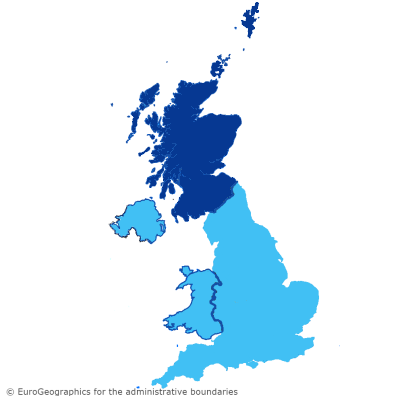
The Scottish Parliament was established in 1999.
Number of Members of Parliament
129
Length of the parliamentary mandate
Four years (exceptionally, the current term has been extended to 5 years until 2016).
Mode of selection of the Members of Parliament
Members are elected under the mixed member proportional representation system: 73 Members represent individual geographical constituencies elected by the 'first past the post' system; a further 56 Members are elected from eight additional member regions, each of which elects seven Members. For further information, see the Scotland Act of 1998, available here (EN).
Population included in the constituency of the regional parliament
5.200.000 inhabitants.
- Competences (legislative and non-legislative), legal bases and policy areas where the regional parliament is active
- List of committees/sub-committees or working groups in the regional parliament
- Committees in charge of scrutinising subsidiarity
- Staff in charge of subsidiarity scrutiny
- Subsidiarity check
- Cooperation/coordination at the regional level
- Cooperation/coordination at the central level
- Cooperation/coordination at the cross-regional level
- Cooperation/coordination at the EU level
Competences (legislative and non-legislative), legal bases and policy areas where the regional parliament is active
Legislative:
All policy areas not specifically reserved in Schedule 5 of the Scotland Act (see the link above) are automatically devolved to the Scottish Parliament. The main issues devolved include the following: agriculture, fisheries, food and forestry, economic development, education, research & training, environment, health, home affairs (including the Scottish legal system and policing), fire services, local government, sport and the arts (excluding broadcasting), transport (excluding safety issues and regulation), tourism, statistics and social work. The Scottish Parliament has the ability to alter income tax in Scotland by up to three pence on the pound
Non-legislative:
The Parliament is inter alia responsible for controlling the Regional Government. For further information, see the Scotland Act (link above).
List of committees/sub-committees or working groups in the regional parliament
The main Standing Committees of the Parliament are:
- Equal Opportunities Committee;
- European and External Relations Committee;
- Finance Committee;
- Health and Sport Committee;
- Infrastructure and Capital Investment Committee;
- Justice Committee;
- Local Government and Regeneration Committee;
- Public Audit Committee;
- Public Petitions Committee;
- Rural Affairs, Climate Change and Environment Committee;
- Standards, Procedures and Public Appointments Committee;
- Subordinate Legislation Committee
- Welfare Reform Committee.
For further information, see here (EN).
Committees in charge of scrutinising subsidiarity There is no specific Committee in charge of scrutinising subsidiarity.
Staff in charge of subsidiarity scrutiny Subsidiarity is monitored by the clerks of the European and External Relations Committee with assistance from the research division (in addition to their other duties).
Subsidiarity check Nature (selective/systematic): Systematic.
Procedure: The Scottish Government provides forewarning as soon as practicable (within a week of receipt of the draft proposal) of all EU draft legislation of devolved relevance with subsidiarity concerns and accompanying Explanatory Memoranda on which the Scottish Government has been consulted by the UK Government..
The Parliament undertakes a systematic subsidiarity check of all EU legislation of devolved relevance (see the legislative competences mentioned above). The Parliament's committees hold the role of actively scrutinising EU legislative proposals. When EU draft legislation is received and subsidiarity issues have been raised in the accompanying Explanatory Memorandum issued by the UK Government, the procedure for engagement is governed by Chapter 10A of Parliament's Standing Orders (available
here (EN). The timescale for engagement is ultimately set by the National Parliament, which acts within the limits established by the European Commission. The Parliament formally transmits its views to the speakers of both chambers of the National Parliament for consideration.
Cooperation/coordination at the regional level See the answer to the previous point. The Scottish Government provides forewarning of all EU draft legislation of devolved relevance with subsidiarity concerns as soon as practicable (within a week of receipt of the draft proposal). Such forewarning is normally in the form of an e-mail. There is no formal agreement but rather an informal arrangement, which has no legal basis.
Cooperation/coordination at the central level No formal coordination exists between the Scottish Parliament and the UK Parliament on a systematic basis. Contact with the House of Commons and the House of Lords only occurs in instances where the Assembly wishes to ask the UK Parliament to issue a “reasoned opinion” on a specific EU proposal. Indeed, the National Parliament (NP) is the principal interlocutor with the European Commission. The timescale for such transmission is set by the respective chamber of the NP. If the NP agrees with the Parliament's report, it will refer to the latter in any reasoned opinion on subsidiarity to the European Institutions. Moreover, secretariat staff in the NP emails the regional parliaments if draft acts/explanatory memoranda raise potential subsidiarity concerns.
Cooperation/coordination at the cross-regional level No formal mechanisms exist at present to coordinate the subsidiarity monitoring work of the UK's devolved legislatures. Information is, however, regularly shared informally between officials in Wales, Scotland and Northern Ireland in relation to proposals which may raise subsidiarity concerns.
Cooperation/coordination at the EU level There are no cooperation/coordination mechanisms with other regions in Europe, but the Parliament has contacts with the EU institutions and participates in CALRE (Conference of European Regional Legislative Assemblies).
